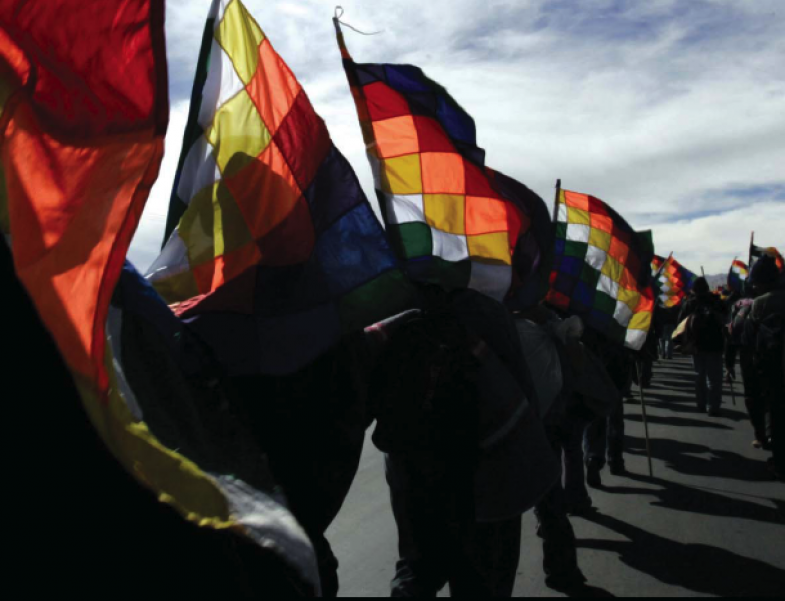With the relentless blare of commercial media, it is sometimes difficult to appreciate that lots of hopeful initiatives for social change are actually underway around the world. The problem is, most of them are too small or obscure for the mainstream media to care. That’s why Other Worlds, an Albuquerque-based social-change group, has produced Who Says You Can’t Change the World? Just Economies and Societies on an Unjust Planet.
The report, by Beverly Bell and her colleagues at Other Worlds, surveys dozens of citizen-led projects in social and economic reconstruction. Among the areas covered: access to health care, struggles to preserve fresh water, alternative education experiments, innovations in the “solidarity economy” and environmental justice, among others. Resources and contact information are included in the report so that interested readers can follow up with their own efforts. The point is to showcase the actual power and generativity of the “non-market economy.”

To give a flavor of the kinds of projects that are profiled in the Other Worlds’ report, here are three of the more interesting citizen-led efforts to protect the commons:
Seed-sharing
“One seed-protecting initiative is the Bija Satyagraha movement in India. Bija means seed, and satyagraha refers to non-violent resistance, a term made popular by Gandhi during the Indian freedom struggle. This movement is shielding farmers’ traditional seed rights from genetically modi?ed seeds and private patents. Beyond the aforementioned seed libraries and exchange programs, the movement also organizes seed fairs to share information and strategies. In the spirit of the 1930 Salt Satyagraha, or salt march, when thousands of Indians walked 240 miles to the sea to collect salt and thus defy the British salt tax, Bija Satyagraha calls on farmers to boldly declare non-cooperation with Indian seed patent laws. Five million peasants have done so. Furthermore, Bija Satyagraha sponsors tribunals against WTO-model copyright policies and laws which deny farmers their seed rights; in these, farmers and researchers present testimony on the damning impacts of these laws.”
Acupuncture for the working class
“Working class people are tremendously open to using any alternative medicine that is accessible and effective,” said Lisa Rohleder, founder of Working Class Acupuncture. Right now, acupuncture and other forms of natural healing in the U.S. remain what she called “boutique therapy, an upper-middle class indulgence. But acupuncture is so cheap, there’s no reason that large numbers can’t get it.”
In an article, Rohleder wrote, “Imagine what could happen if acupuncture were widely available to everyone in America, regardless of whether they had insurance or not. Imagine the impact of a clinic in every neighborhood: patients getting off expensive pain medication they can’t afford, uninsured asthma patients no longer needing to go to the ER, overwhelmed working parents no longer yelling at their kids or drinking to escape from the stress of their lives – because they have an alternative.” The clinic’s six acupuncturists treat more than 450 people a week in one of the lowest income and most ethnically diverse Portland neighborhoods.
Time Banks
“One solidarity economy prospering throughout the U.S. is the time bank. In a time bank, people offer services they can provide in exchange for services they need. An individual performs a service – replacing a toilet or babysitting, say – and earns hours which he or she can use in the same network to get his or her fence ? xed or have a photo portrait taken of the family. No cash is involved and all hours are valued equally, expanding the realm of what low-income (and other) people can access, changing the nature of the interaction, and creating community. Pasadena, Maryland has used time banking for 16 years to help keep older and disabled adults independent and in their homes. There a young neighbor might contribute time to build a wheelchair ramp and, in exchange, receive Portuguese lessons from a different senior who is a native speaker. Time banks have spread to more than eighty U.S. towns and more than 20 other countries.”
As a ray of hope and inspiration as well as solid research, Who Says You Can’t Change the World? is worth downloading at as pdf or requesting from Other Worlds. To read an excellent interview with Beverly Bell — “Grassroots Power and Non-market Economies,” see the latest issue of the Multinational Monitor.



